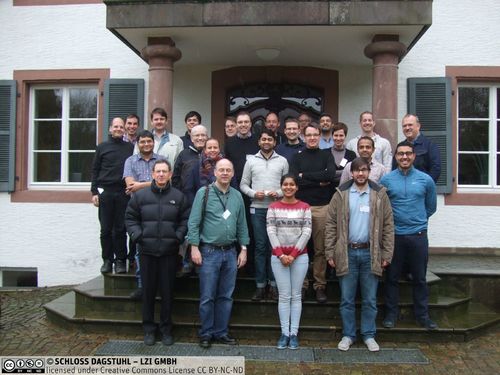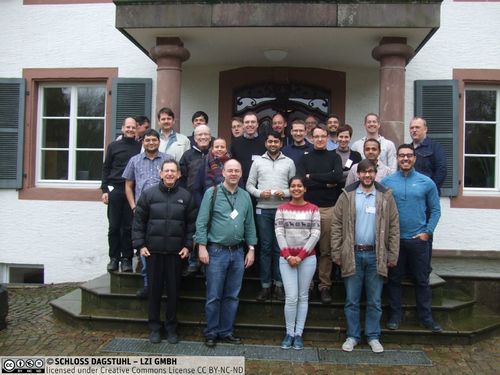Dagstuhl Seminar 16012
Global Measurements: Practice and Experience
( Jan 04 – Jan 07, 2016 )
Permalink
Organizers
- Arthur W. Berger (Akamai Technologies - Cambridge, US)
- Philip Eardley (British Telecom R&D - Ipswich, GB)
- Jörg Ott (TU München, DE)
- Jürgen Schönwälder (Jacobs Universität - Bremen, DE)
Coordinator
- Vaibhav Bajpai (Jacobs Universität - Bremen, DE)
Contact
- Dagmar Glaser (for administrative matters)
Impacts
- Global Measurements : Practice and Experience : Report on Dagstuhl Seminar #16012 : article : pp. 32-39 - Bajpai, Vaibhav; Berger, Andrew W.; Eardley, Philip; Ott, Jörg; Schönwälder, Jürgen - New York : ACM, 2016 - (Computer communication review : 46. 2016,1).
- Weak Keys for AEZ, and the External Key Padding Attackarticle in LNCS 10159 : pp. 223-237 - Mennink, Bart - Berlin : Springer, 2017 - (Lecture notes in computer science ; 10159 : article).
Several large-scale Internet measurement systems have been deployed during the last years in order to understand how the network is performing, to observe how it is evolving, and to determine where failures or degradations occur. Large-scale measurements are meanwhile used to drive network operations and to dynamically adjust how services are delivered to customers. One key challenge is that global Internet measurement systems can generate large amounts of data that need to be processed to derive relevant information.
This Dagstuhl Seminar is a follow-up of Dagstuhl Seminar 13472 “Global Measurement Frameworks” that took place in November 2013. It aims at discussing the practical experience gained with global measurement frameworks and it will look at the experience gained with metrics, data processing technologies, and data analysis methods. Starting from these three dimensions, the seminar aims to discuss the following key questions:
Measurement Metrics
- Which metrics have been found useful for measuring quality of experience of certain classes of services?
- Which metrics have been found problematic?
- Is it possible to find indicators for good metrics and problematic metrics?
- Is it possible to formulate guidelines for the development of robust metrics?
Data Processing Technologies
- Which technologies have been found useful for storing and processing large amounts of measurement data?
- Which technologies were found to be problematic?
- Are there new promising technologies being developed that may be used in the future?
- What are the specific requirements for dealing with global measurement data and how do they relate to or differ from other big data applications?
Data Analysis Methods
- Which data analysis techniques have been found useful?
- Which data analysis techniques have been found problematic?
- Are there any novel promising techniques that need further research and development?
Several large-scale Internet measurement platforms have been deployed during the last years in order to understand how the Internet is performing, to observe how it is evolving, and to determine where failures or degradations occur. Examples are the CAIDA Archipelago (Ark) platform [6] (used for Internet topology discovery and detecting congestion on interdomain links), the SamKnows platform [4] (used by regulators and network operators to study network performance), the RIPE Atlas platform [3, 5] (that provides measurement services to network operators and researchers), the Netradar system [8] (for performing wireless performance measurements), and the BISmark project [9]. European collaborative research incorporate measurement results into network management systems (e.g., Leone) [2]. Related projects (e.g., Flamingo) [1] are increasingly working with measurement data from these platforms. Large-scale measurements are meanwhile also used to drive network operations or to dynamically adjust how services are delivered to customers. Content Delivery Network (CDN) providers use measurement data to optimize content caches and to tune load balancing algorithms. One key challenge is that global Internet measurement systems can generate large amounts of data that need to be processed to derive relevant information.
This seminar (#16012) was a followup of the Dagstuhl seminar on Global Measurement Frameworks (#13472) [7]. The main focus of the first seminar was an exchange of ideas on the development of global measurement infrastructures, frameworks and associated metrics. Some of this work is now further pursued in standardization bodies [4] such as the IETF Large-Scale Measurement of Broadband Performance (LMAP) working group and the Broadband Forum. The goal of this followup seminar was to focus on the experience obtained with different metrics, tools, and data analysis techniques. It provided a forum for researchers to exchange their experience with different practices to conduct global measurements. The aim was to identify what works well in certain contexts, what has proven problematic in other contexts, and identify open issues that need further research. The seminar approached this by looking at three distinct dimensions: (a) Measurement metrics, (b) data processing technologies and (c) data analysis methodologies. Some key questions were:
- Which metrics have been found useful for measuring Quality of Experience (QoE) of certain classes of services? Which metrics have been found problematic? Is it possible to find indicators for good metrics and problematic metrics?
- Which technologies have been found useful for storing and processing large amounts of measurement data? Which technologies were found to be problematic? Are there new promising technologies that may be used in the future? What are the specific requirements for dealing with large-scale measurement data and how do they relate to or differ from other big data applications?
- Which data analysis techniques have been found to be useful? Which data analysis techniques have been found to be problematic? Are there any novel promising techniques that need further research and development?
Although at the seminar the participants chose to organize the discussions on more general topics than these specific questions, during the discussions most of these questions were addressed to one degree or another.
References
- Flamingo – Management of the Future Internet. http://www.fp7-flamingo.eu. [Online; accessed 18-January-2016].
- Leone – From Global Measurements to Local Management. http://www.leone-project.eu. [Online; accessed 18-January-2016].
- RIPE Atlas: A Global Internet Measurement Network. Internet Protocol Journal, September 2015. URL: http://ipj.dreamhosters.com/wp-content/uploads/2015/10/ipj18.3.pdf.
- V. Bajpai and J. Schönwälder. A Survey on Internet Performance Measurement Platforms and Related Standardization Efforts. Communications Surveys Tutorials, IEEE, 17(3):1313–1341, thirdquarter 2015. doi:10.1109/COMST.2015.2418435.
- Vaibhav Bajpai, Steffie Jacob Eravuchira, and Jürgen Schönwälder. Lessons Learned From Using the RIPE Atlas Platform for Measurement Research. SIGCOMM Comput. Commun. Rev., 45(3):35–42, July 2015. doi:10.1145/2805789.2805796
- kc claffy. The 7th Workshop on Active Internet Measurements (AIMS7) Report. SIGCOMM Comput. Commun. Rev., 46(1):50–57, January 2016. doi:10.1145/2875951.2875960.
- Philip Eardley, Marco Mellia, Jörg Ott, Jürgen Schönwälder, and Henning Schulzrinne. Global Measurement Framework (Dagstuhl Seminar 13472). Dagstuhl Reports, 2014. doi: http://dx.doi.org/10.4230/DagRep.3.11.144.
- S. Sonntag, J. Manner, and L. Schulte. Netradar – Measuring the wireless world. WiOpt’13, May 2013.
- Srikanth Sundaresan, Sam Burnett, Nick Feamster, and Walter De Donato. BISmark: A Testbed for Deploying Measurements and Applications in Broadband Access Networks. USENIX ATC’14, pages 383–394, 2014. URL: http://dl.acm.org/citation.cfm?id=2643634.2643673.
- B. Trammell, P. Casas, D. Rossi, A. Bar, Z. Houidi, I. Leontiadis, T. Szemethy, and M. Mellia. mPlane: an Intelligent Measurement Plane for the Internet. IEEE Communications Magazine, 52(5):148–156, May 2014. doi:10.1109/MCOM.2014.6815906
 Vaibhav Bajpai and Arthur W. Berger and Philip Eardley and Jörg Ott and Jürgen Schönwälder
Vaibhav Bajpai and Arthur W. Berger and Philip Eardley and Jörg Ott and Jürgen Schönwälder
- Vaibhav Bajpai (Jacobs Universität - Bremen, DE) [dblp]
- Arthur W. Berger (Akamai Technologies - Cambridge, US) [dblp]
- José Jair C. de Santanna (Univ. Twente, NL) [dblp]
- Georg Carle (TU München, DE) [dblp]
- Renata Cruz Teixeira (INRIA - Le Chesnay, FR) [dblp]
- Philip Eardley (British Telecom R&D - Ipswich, GB) [dblp]
- Markus Fiedler (Blekinge Institute of Technology - Karlskrona, SE) [dblp]
- Phillipa Gill (Stony Brook University, US) [dblp]
- Oliver Hohlfeld (RWTH Aachen, DE) [dblp]
- Steffie Jacob Eravuchira (SamKnows Ltd. - London, GB) [dblp]
- Daniel Karrenberg (RIPE NCC - Amsterdam, NL) [dblp]
- Mirja Kühlewind (ETH Zürich, CH) [dblp]
- Andri Lareida (Universität Zürich, CH) [dblp]
- Jukka Manner (Aalto University, FI) [dblp]
- Ian Robin Marsh (Swedish Institute of Computer Science - Kista, SE) [dblp]
- Al Morton (AT&T - Middletown, US) [dblp]
- Jörg Ott (TU München, DE) [dblp]
- Colin Perkins (University of Glasgow, GB) [dblp]
- Philipp Richter (TU Berlin, DE) [dblp]
- Jürgen Schönwälder (Jacobs Universität - Bremen, DE) [dblp]
- Henning Schulzrinne (Columbia University - New York, US) [dblp]
- Varun Singh (Callstats.IO, FI) [dblp]
- Burkhard Stiller (Universität Zürich, CH) [dblp]
- Srikanth Sundaresan (ICSI - Berkeley, US) [dblp]
- Brian Trammell (ETH Zürich, CH) [dblp]
- Roland van Rijswijk-Deij (University of Twente, NL) [dblp]
Related Seminars
- Dagstuhl Seminar 13472: Global Measurement Framework (2013-11-17 - 2013-11-20) (Details)
Classification
- modelling / simulation
- networks
- world wide web / internet
Keywords
- Internet measurements
- Quality of experience
- Network management
- Traffic engineering



 Creative Commons BY 3.0 Unported license
Creative Commons BY 3.0 Unported license
